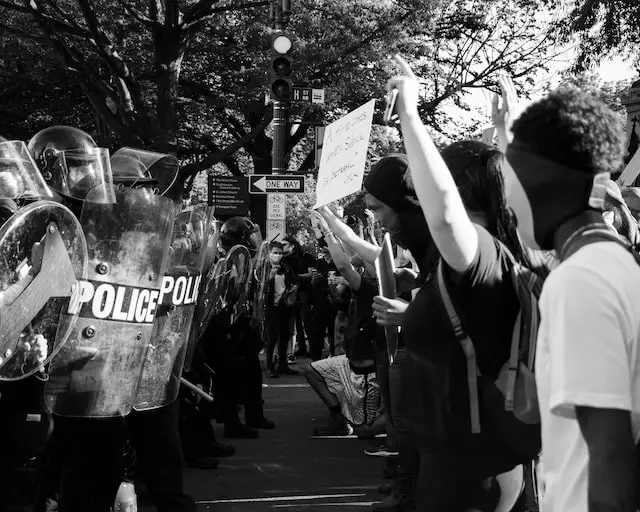Top Songs About Dirty Cops
Distress about police brutality has long been reflected in popular music as a means of expressing frustration with the situation.
Rappers and MCs who weren’t afraid to address social issues head-on became a prominent part of Hip Hop’s cultural impact. It’s not surprising that hip-hop has become one of the primary outlets for voicing frustration with police brutality; this is especially true among minority youth and those living in urban areas.
We’ve compiled a list of some of the best songs about dirty cops.
1. “Be Free” by J. Cole
J. Cole’s “Be Free” is almost certainly going to be the first song that comes to anyone’s mind when they are asked to mention songs about Dirty Cops.
Cole’s anguish is conveyed in “Be Free.” Cole as he mourns the death of yet another unarmed black guy at the hands of police. As he opens his eyes to the news of police shooting young black guys, he expresses his dismay and dismay.
Using the chorus as his platform, the rapper addresses the root causes of the enslavement of African Americans, from slavery to racism, classism, incarceration, and mental enslavement.
In discussing these ideas, he concludes that black people are cowed into submission by the deaths and the sense of isolation they suffer in their fight against injustice, despite their efforts to enjoy freedom.
The rapper conveys a plea to all listeners to join the fight against police violence, racism, and injustice while retelling a detailed eyewitness account of the events leading up to the shooting of Michael Brown.
Cole, who created the song in commemoration of Michael Brown, posted it on SoundCloud along with a message commemorating all young black males killed by police in the United States. He went on to express his hope that one day all injustice will be eliminated and the world would be at peace.
2. “Alright” by Kendrick Lamar
The chorus of Kendrick Lamar’s “Alright” reflects an upbeat, confident attitude that things will improve in the long run despite present difficulties.
As the introduction implies, things are currently chaotic. Even though racism in institutions and police brutality still issues in today’s America, Kendrick maintains an optimistic outlook. He assures his audience that everything will work out in the end if they just put their faith in God.
In the following lyrics, Kendrick addresses the music industry, police brutality, and how flaws have become more apparent as he has become more successful financially. He freely acknowledges that he has insight into the problems that plague his life, implying that his transgressions are unforgivable and that karma would have its way with him soon.
The author addresses how he will keep writing until he is right with God among references to the devil’s temptations and the melancholy he fell into as a result of the sudden change from poverty to popularity.
The rapper likens it to the problem of police brutality and tells his audience not to lose hope because “a brighter future is imminent, despite the disproportion against blacks and the institutional mess.”
3. “I Can’t Breathe” – H.E.R.
The song was inspired by the nationwide unrest following the police shooting of George Floyd Jr. Floyd, a Black man, who was essentially gunned down in broad sight by White police officers.
It was reported that he said, “I can’t breathe,” immediately before he passed away. Therefore, the phrase has become something of a de facto motto for the aforementioned movement.
More than that, it seems like H.E.R. is using it as a metaphor to critique the entire racist structure in the United States. That is to say, being unable to breathe isn’t just a reference to Floyd inside the song’s context.
Furthermore, on a larger scale, it is designed to represent the experience of African-Americans living with systemic racism. In other words, it constrains and stifles them. Therefore, it would appear that the singer is advocating for several reforms as a means of responding to these ongoing injustices.
For starters, Black people should start loving themselves more. As a corollary, she hopes that people would have more compassion for what they are going through. This is one of the songs about dirty cops that reflects on a lot of things.
4. “World on Fire” By Daughtry
Do you recall the bushfires that ravaged Australia in the years 2019 and 2020? As well as taking a few lives, they were a massive ecological and economical disaster for Australia.
It also appears that the event was widely covered by news outlets around the world. There have been so many changes even between then and the end of 2020 that it’s easy to forget that this even happened.
The song’s title, then, has a dual meaning in terms of the literal and the figurative. The climax of those aforementioned wildfires, which occurred in January 2020, served as direct inspiration.
However, many listeners would interpret the song’s lyrical symbolism and the timing of its release (the second half of 2020) as evidence that it was written around the coronavirus epidemic, the George Floyd protests, or something along those lines. Chris Daughtry had concluded that “it was as if (Daughtry) had a crystal ball,” or could foresee the future when they were writing this song.
Some critics have even labeled this tune as apocalyptic, so it seems we have concluded. That’s the general mood of the piece.
The singer isn’t feeling very optimistic about either the present or the future. In addition to this, shall we say, Biblical fatalism, there is an additional focus on police brutality and violence against the police, all of which truly caught us off guard in 2020?
5. “Commander in Chief” By Demi Lovato
Demi Lovato’s single “Commander in Chief” is a scathing indictment of the president’s handling of several pressing issues facing the country in 2020. She asks him many pointed questions to get a response from him.
The majority of these inquiries are focused on his thoughts on racial inequality and the Coronavirus pandemic, both of which affected several people at the time the song was written.
At the start of the song, the performer criticizes Trump for being insensitive to the plight of others. This is because he has shown a “lackadaisical” attitude toward several pressing American problems, including the California wildfires, the coronavirus pandemic, corrupt law enforcement, and racial inequality.
She doesn’t understand how he can rest and breathe while so many people are dying and chaos reigns throughout the country.
Demi encourages her audience to keep up the battle for what they believe in during the bridge. Probably the Black Lives Matter Movement, she supports protests. She also urges eligible U.S. citizens to cast ballots in the 2020 presidential election.







